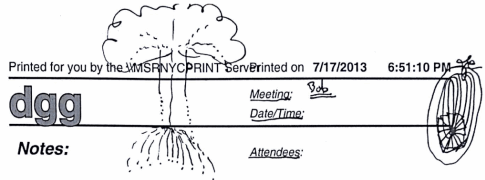Why does printing cover pages save paper?
MANY THEORIES
One of the DSN editor’s cover sheets of staggering genius
Last week, we wrote about how setting printers to print double-sided by default saves paper. Kind of a no brainer. But we ended with a “counterintuitive coda” about how cover pages save paper. Counterintuitively, we were inundated with emails about the coda and none about the main finding. People wanted to know “How much paper did the cover sheets save?”, “Why does it work?” and so on.
HOW MUCH PAPER DOES IT SAVE?
According to a blurb by Microsoft IT “Our internal studies have shown that when banner pages are disabled, print volumes increase 15% to 17%”. That’s a big effect: That means you’re wasting a ream of paper every 6 reams you print. Interestingly, it’s quite close the paper savings associated with making double-sided printing the default (doubled sided: 15% decrease in paper consumption; cover pages:13-15% decrease).
WHY DOES IT SAVE PAPER?
Microsoft IT says it’s “because people end up picking up print jobs that don’t belong to them. When this occurs, missing print jobs are reprinted, which wastes time and money.”
While that sounds reasonable, we can imagine (with help from some comments from readers) some other reasons it might work. Here’s a running list of possibilities. Happy to add more if people think of them.
WHY COVER PAGES MIGHT SAVE PAPER
- Without cover pages, people pick up print jobs that don’t belong to them, causing reprinting (as mentioned)
- Without cover pages, orphaned print jobs left in the printer are thrown away instead of returned to their owners
- With cover pages, the threat of public shaming gives people an incentive not to forget to pick up print jobs
- With cover pages, the threat of public shaming makes people embarrassed about printing large jobs (or many jobs) in the first place
- With cover pages, people are less likely to print one page when they realize that one cover sheet will be wasted by doing so
Note that the cover sheet is simply a default here, and can be switched off for any one job as desired.
All this talk of counterintuitive effects reminds us of a recent talk by a member of the UK’s Behavioral Insights Team (Nudge Unit). In the presentation, the member showed several versions of a form letter and asked the researchers in the room to guess which one had the biggest impact. The letter the researchers guessed would have the largest effect turned out to have one of the smallest impacts. Admittedly, the effect sizes were small, but it showed the importance of randomized experimentation and going beyond armchair theorizing in behavioral economics.


